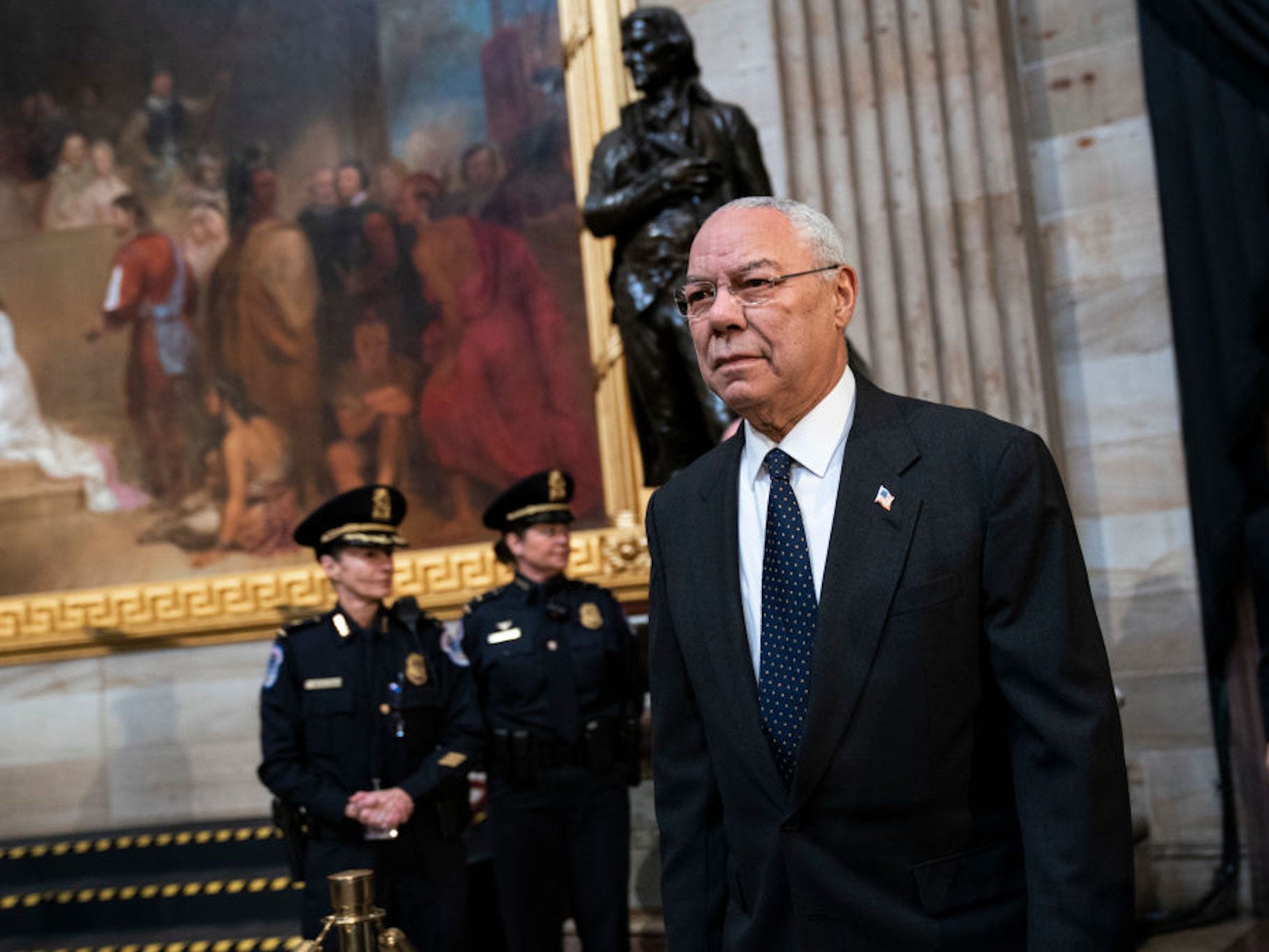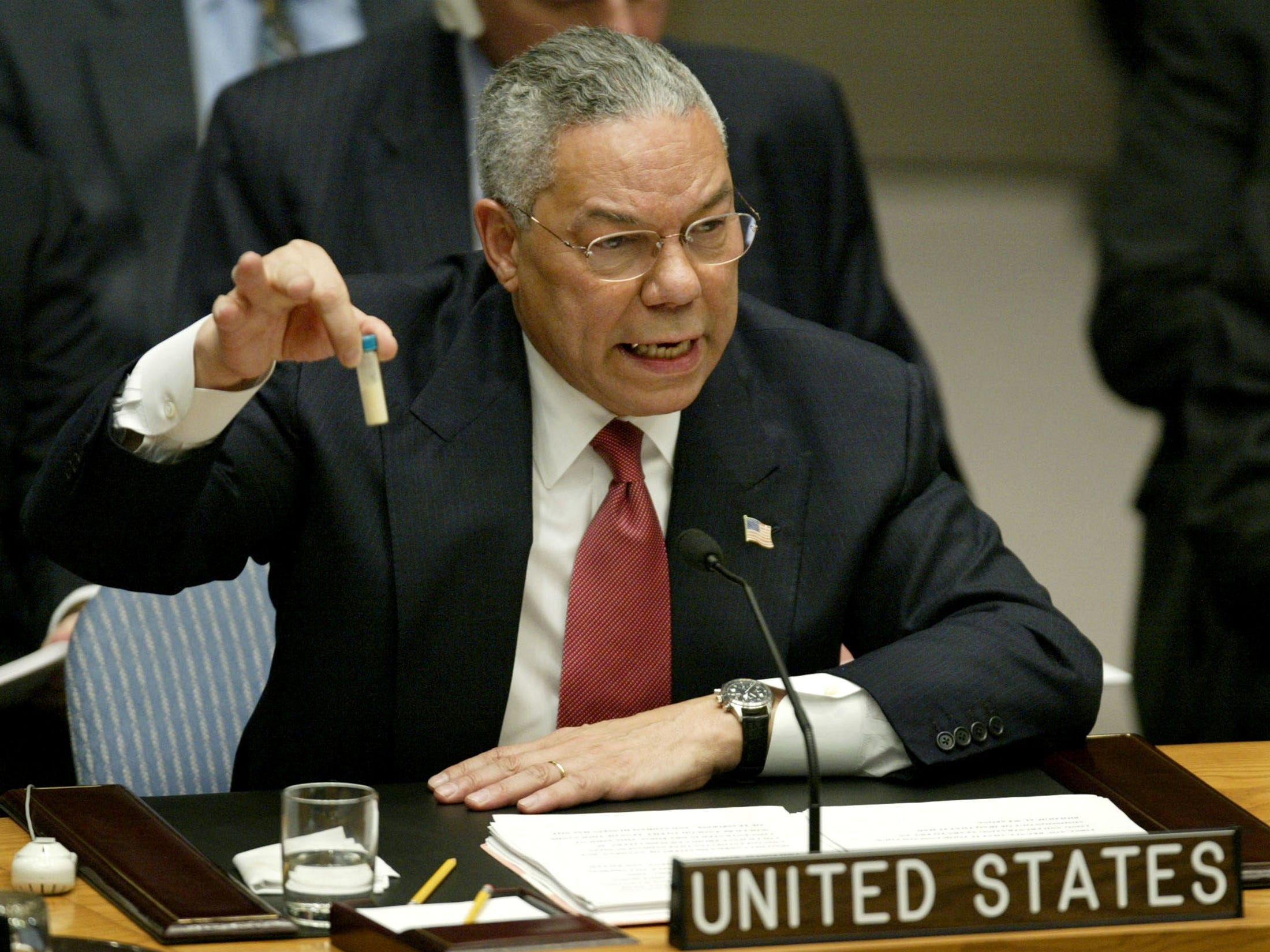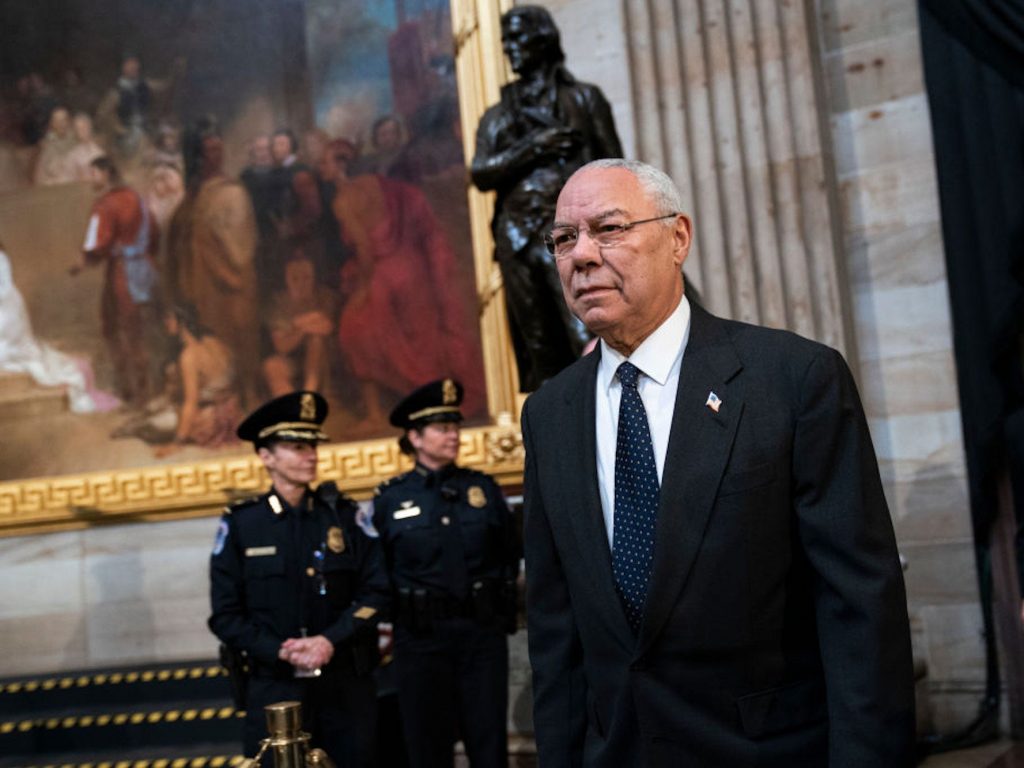
Drew Angerer/Getty Images
- Colin Powell became the highest ranking Black and Caribbean-American official in Washington.
- Powell had many accolades throughout his military career but also many miscues in Washington.
- Caribbean-American public figures and communities highlighted Powell's complex legacy online.
Former US Secretary Colin Powell's complicated and complex legacy throughout his nearly five decade career is being remembered, critiqued and commemorated around the world.
Powell, born and raised in the South Bronx, New York, died at Walter Reed National Military Hospital last week at the age of 84 from complications of COVID-19.
The first Black Secretary of State had been battling a multi-year bout with myeloma, a type of blood cancer and Parkinson's disease.
As Secretary of State under President George W. Bush, Powell became the highest ranking Black official in Washington before the election of Democrat President Barack Obama.
Powell was a lifelong Republican who left the party after the attempted insurrection of January 6.
And as the son of Jamaican immigrants, Powell was the highest ranking Caribbean-American official before the election of Vice President Kamala Harris - whose father hails from the same island.
This week, in commemoration of Powell as a trailblazer, Black-immigrant communities gave balanced accounts of honoring Powell's accomplishments but also recognizing his record in some of the most powerful positions in the US government.
Prominent Caribbean-American leaders and public figures shared their reflections
Over the years Powell has stayed connected to his Jamaican roots, returning to the Caribbean nation at the request of then Prime Minister Michael Manley after the Gulf War in 1992.
"Keep believing in yourself; keep believing in the strength of your society and your culture," Powell said at Jamaica's 50th Independence gala. "Keep being proud of your heritage but recognize that there are problems that we all have to deal with."
Jamaican officials also offered condolences to the United States and Powell family. In a statement, Prime Minister Andrew Holness celebrated the former secretary, noting "General Powell never forgot his roots and family lineage in Jamaica."
The residential plaza where the US Embassy in Kingston, Jamaica, is housed is named in his honor.
Vice President Kamala Harris, whose father was also a Jamaican immigrant before moving back to the country, expressed her condolences of the passing of Powell. Saying in part "he dedicated his life to defending our nation and always showed the world the best of who we are."
Last week, President Joe Biden ordered the flags at the White House be lowered to half staff until October 22nd. Other state Governors also ordered the flags be lowered to half staff last week to honor Powell.
Public figures and communities online noted Powell's legacy can be both celebrated and critiqued

REUTERS/Ray Stubblebine
In a statement on Twitter, Brooklyn, US Congresswoman Yvette Clarke, and fellow Jamaican-American extended her "deepest condolences to the Powell Family," and highlighted when President Obama sent her along with Powell to celebrate Jamaica's 50th Independence Anniversary.
"While we both represent two different political parties and I've questioned his role with regard to the Iraq War, as also he ultimately did, he was a principled statesman who loved his country."
Some throughout Caribbean-American communities questioned what Powell's job institutionally has done to the region and diaspora.
"Good for him and his rise to prominence as a Black man," Kris Ayala Strachan, a Bahamian-American, tweeted. "But he was an integral part of why we struggled & struggle today against white supremacy and US imperialism in the Caribbean & globally."
-Kris Ayala-Strachan 🇧🇸🇵🇷 (@BahamaPapa_) October 18, 2021
And Washington Post Columnist Karen Attiah, a Ghanaian and Nigerian-American journalist, shared her conflicted thoughts about Powell in a Twitter thread, noting that for many Black families -- especially immigrant and first generation ones -- he represented "excellence in public service."
Institutionally, however, Attiah adds that Powell's representation in Black in communities didn't mean much for Iraqi people. Many were on the receiving end of a devastating US occupation and foreign policy, and still face the consequences today.
"I remember as a 16 year old, being aghast that Colin Powell was in front of the UN making the case for WMD's [weapons of mass destruction] in Iraq. I argued in my debate class that there wasn't enough evidence and the U.S. shouldn't invade unilaterally.
I remember thinking 'why is he doing this??'"
-Karen Attiah (@KarenAttiah) October 18, 2021
MSNBC host Joy-Ann Reid, a Guyanese-American, argued that Powell's legacy can be both celebrated and criticized - especially among Black first generation Americans.
On Twitter she called out the "tough moments around wars" while reflecting that Powell's "was a "decent man and a great American we could all be proud of."
"I know my Caribbean-American [family] certainly are. Wishing peace to his soul & family," she said, calling his death "so shocking and heartbreaking."
Black immigrant communities wrestle with "a symbol of achievement"
Over the last week, Black immigrant communities have shown a sense of pride in commemorating Powell but also acknowledged the harm Powell was directly or indirectly responsible for.
Attiah,in her final tweet of her Twitter thread argued that Powell can "stand for a symbol of achievement, and integrity," while offering an opportunity to reflect on America's capacity for cruelty and reckless aggression abroad --- and how we rarely hold our leaders accountable for it."
Powell is survived by his wife Alma, three children and two grandchildren.
